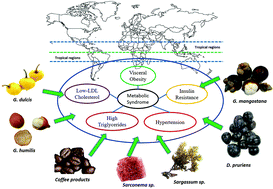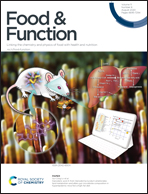Tropical foods as functional foods for metabolic syndrome
Abstract
Tropical foods are an integral part of the traditional diet and form part of traditional medicine in many countries. This review examines the potential of tropical foods to treat signs of metabolic syndrome, defined as a chronic low-grade inflammation leading to obesity, hypertension, impaired glucose tolerance, insulin resistance, dyslipidaemia and fatty liver. It is a major risk factor for cardiovascular and metabolic disease as well as osteoarthritis and some cancers. Tropical foods such as seaweeds and tropical fruits including indigenous fruits such as Davidson's plums are effective in reducing these signs of metabolic syndrome in rats, as well as reducing degeneration of bone cartilage and altering gut microbiome. Further, waste products from tropical fruits including mangosteen rind, coffee pulp and spent coffee grounds provide further options to reduce metabolic syndrome. Production of local tropical foods and local recovery of food waste from these foods could allow the development of commercial, sustainable and cost-effective functional foods in tropical countries. The aim is to develop these functional foods to reduce the incidence of metabolic syndrome and decrease the risk of costly chronic cardiovascular and metabolic disorders locally and globally.

- This article is part of the themed collection: International Conference on Polyphenols and Health (ICPH2019) collection


 Please wait while we load your content...
Please wait while we load your content...